Abstract
OBJECTIVE--To assess the quality of preregistration house officer training in eight English regions. DESIGN--Postal questionnaire. SETTING--Thames, East Anglian, Mersey, Northern, and Wessex regions. PARTICIPANTS--1670 preregistration house officers. MAIN OUTCOME MEASURES--Education, hours of work, workload, conditions of work, and attitudes to job and medicine as a career. RESULTS--Response rate was 69% (1146 replies). Most house officers had attended induction courses (1036/1129 (92%)); 74% (757/1024) found them satisfactory. The proportions who had never received adequate guidance on how to break bad news and how to control pain were 59% (670/1135) and 56% (634/1136) respectively. There was much variation between regions. Overall, 65% (736/1138) reported confidence in performing cardiopulmonary resuscitation. Most respondents (95% (1089/1142)) worked an on call rota, 3% (36) a partial shift, and 0.6% (seven) a full shift; 19% (202) were on duty for average weekly hours that exceeded the targets for 1 April 1993. House officers had a median of 20 patients under their care and clerked a median of 10 emergency cases, six routine cases, and two day cases a week. Over half (690/1128 (61%)) could not obtain hot food after 8 pm, 20% (223/1095) did not always have clean sheets available in their on call room, and 45% (462/1036) did not consider the protection of staff against violence to be adequate at their hospital. The most important problems with the preregistration year were inappropriate or non-medical tasks (ranked first by 360 respondents), hours of work (359), and pay for out of hours work (167). Overall 57% (646/1125) would encourage a friend to apply for their post, but only 24% (266/1112) would encourage a friend to take up medicine and 44% (494/1112) would discourage the idea. CONCLUSIONS--House officers' training is deficient in important respects, with inappropriate tasks and heavy clinical workloads impeding the provision of proper education.
Full text
PDF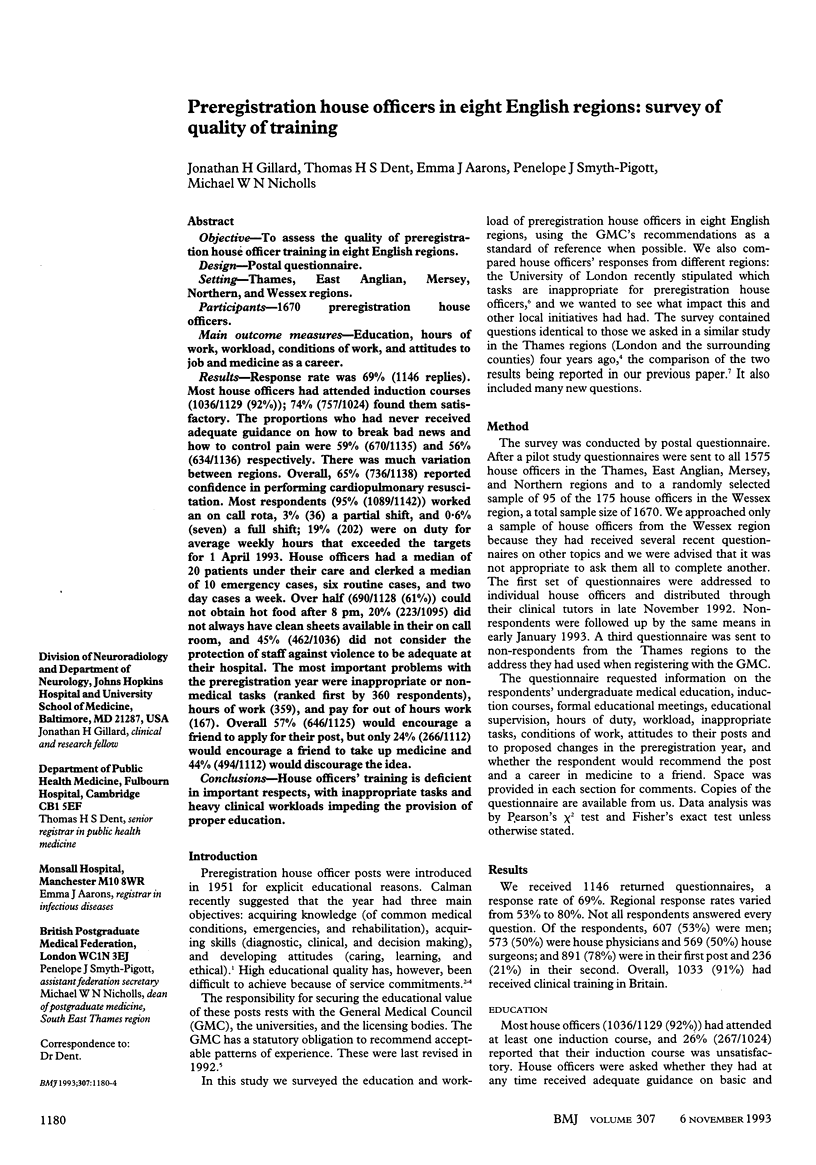
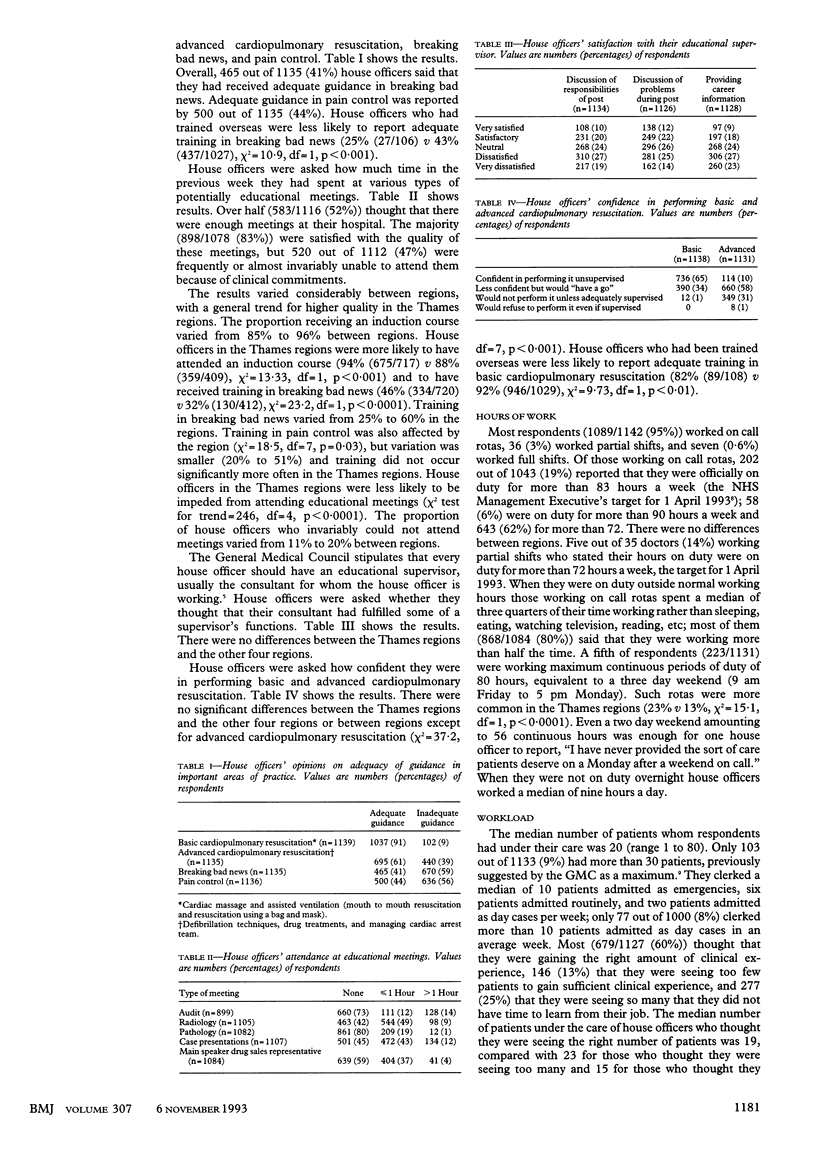
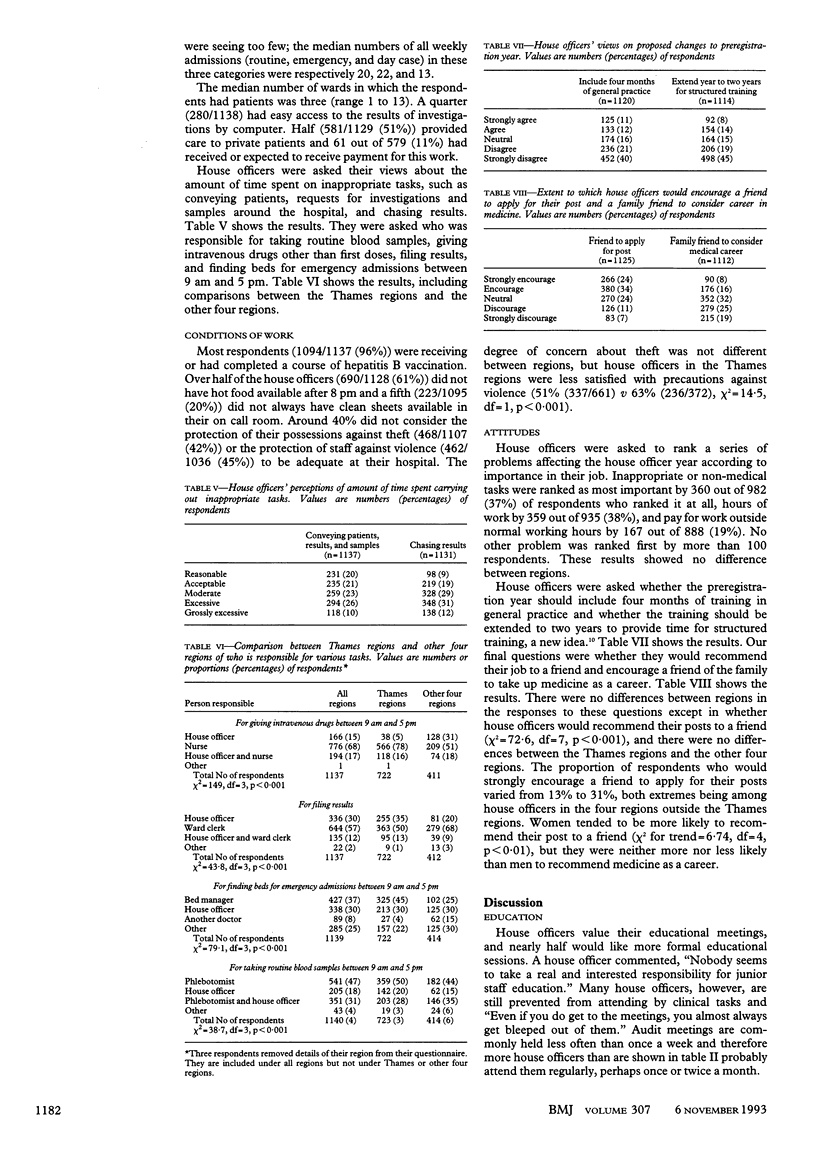
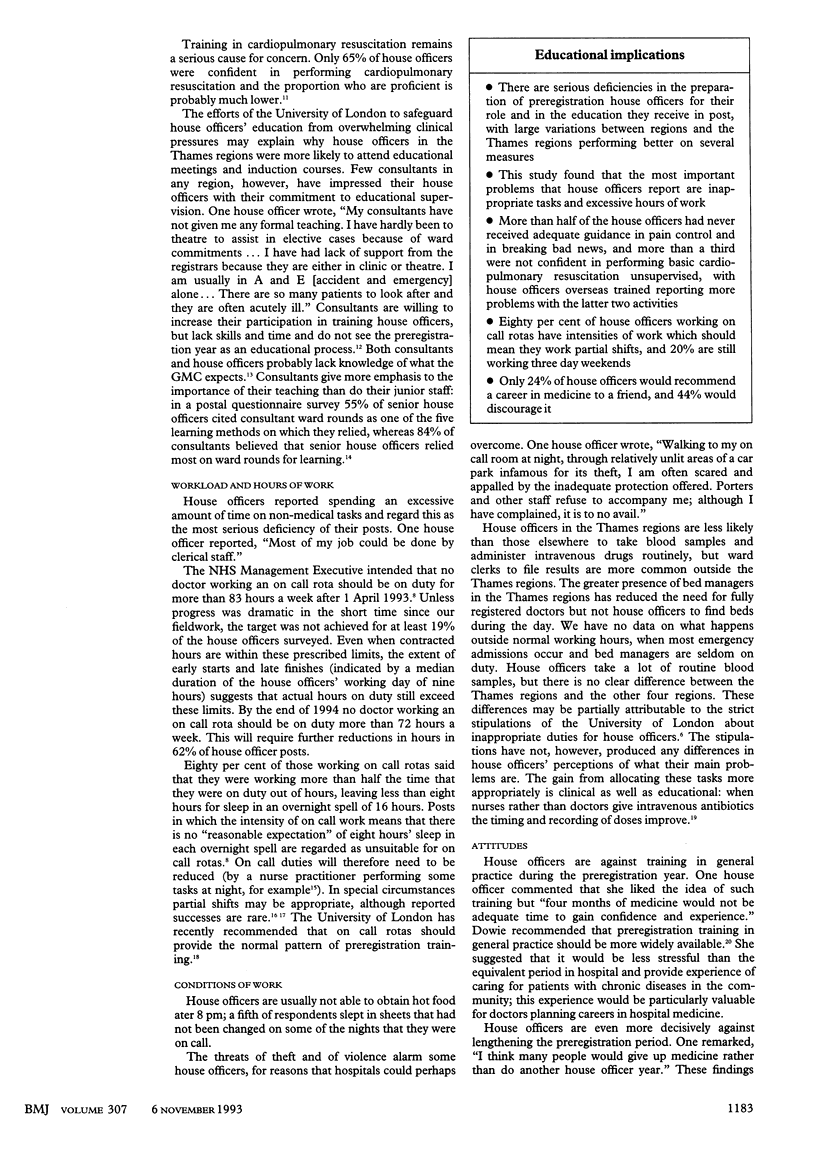
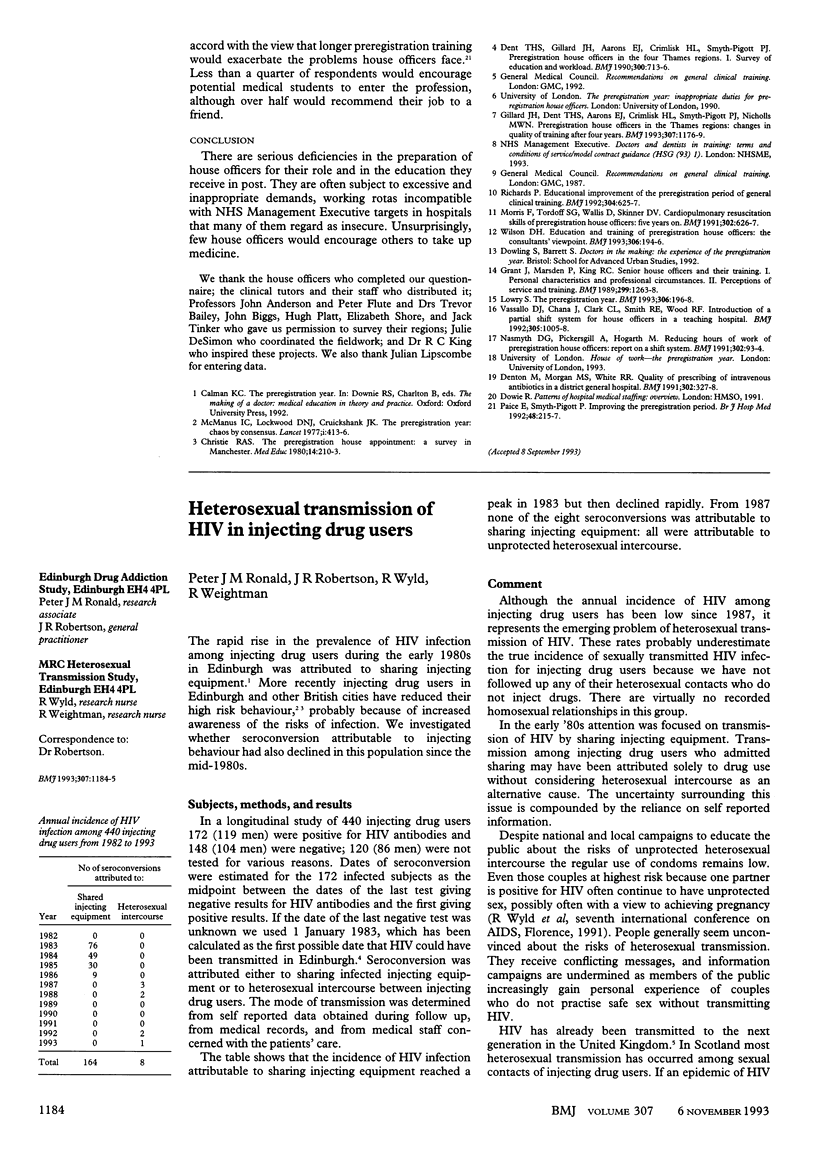
Selected References
These references are in PubMed. This may not be the complete list of references from this article.
- Christie R. A. The pre-registration house appointment. a survey in Manchester. Med Educ. 1980 May;14(3):210–213. doi: 10.1111/j.1365-2923.1980.tb02256.x. [DOI] [PubMed] [Google Scholar]
- Dent T. H., Gillard J. H., Aarons E. J., Crimlisk H. L., Smyth-Pigott P. J. Preregistration house officers in the four Thames regions: I. Survey of education and workload. BMJ. 1990 Mar 17;300(6726):713–716. doi: 10.1136/bmj.300.6726.713. [DOI] [PMC free article] [PubMed] [Google Scholar]
- Denton M., Morgan M. S., White R. R. Quality of prescribing of intravenous antibiotics in a district general hospital. BMJ. 1991 Feb 9;302(6772):327–328. doi: 10.1136/bmj.302.6772.327-a. [DOI] [PMC free article] [PubMed] [Google Scholar]
- Gillard J. H., Dent T. H., Aarons E. J., Crimlisk H. L., Smyth-Pigott P. J., Nicholls M. W. Preregistration house officers in the Thames regions: changes in quality of training after four years. BMJ. 1993 Nov 6;307(6913):1176–1179. doi: 10.1136/bmj.307.6913.1176. [DOI] [PMC free article] [PubMed] [Google Scholar]
- Grant J., Marsden P., King R. C. Senior house officers and their training. I. Personal characteristics and professional circumstances. BMJ. 1989 Nov 18;299(6710):1263–1265. doi: 10.1136/bmj.299.6710.1263. [DOI] [PMC free article] [PubMed] [Google Scholar]
- Lowry S. The preregistration year. BMJ. 1993 Jan 16;306(6871):196–198. doi: 10.1136/bmj.306.6871.196. [DOI] [PMC free article] [PubMed] [Google Scholar]
- McManus I. C., Lockwood D. N., Cruickshank J. K. The preregistration year: Chaos by consensus. Lancet. 1977 Feb 19;1(8008):413–417. doi: 10.1016/s0140-6736(77)92616-2. [DOI] [PubMed] [Google Scholar]
- Morris F., Tordoff S. G., Wallis D., Skinner D. V. Cardiopulmonary resuscitation skills of preregistration house officers: five years on. BMJ. 1991 Mar 16;302(6777):626–627. doi: 10.1136/bmj.302.6777.626. [DOI] [PMC free article] [PubMed] [Google Scholar]
- Nasmyth D. G., Pickersgill A., Hogarth M. Reducing hours of work of preregistration house officers: report on a shift system. BMJ. 1991 Jan 12;302(6768):93–94. doi: 10.1136/bmj.302.6768.93. [DOI] [PMC free article] [PubMed] [Google Scholar]
- Paice E., Smyth-Piggot P. Improving the preregistration period. Br J Hosp Med. 1992 Sep 2;48(5):215–217. [PubMed] [Google Scholar]
- Richards P. Educational improvement of the preregistration period of general clinical training. Council of Deans of United Kingdom Medical Schools and Faculties. BMJ. 1992 Mar 7;304(6827):625–627. doi: 10.1136/bmj.304.6827.625. [DOI] [PMC free article] [PubMed] [Google Scholar]
- Vassallo D. J., Chana J., Clark C. L., Smith R. E., Wood R. F. Introduction of a partial shift system for house officers in a teaching hospital. BMJ. 1992 Oct 24;305(6860):1005–1008. doi: 10.1136/bmj.305.6860.1005. [DOI] [PMC free article] [PubMed] [Google Scholar]
- Wilson D. H. Education and training of preregistration house officers: the consultants' viewpoint. BMJ. 1993 Jan 16;306(6871):194–196. doi: 10.1136/bmj.306.6871.194. [DOI] [PMC free article] [PubMed] [Google Scholar]


